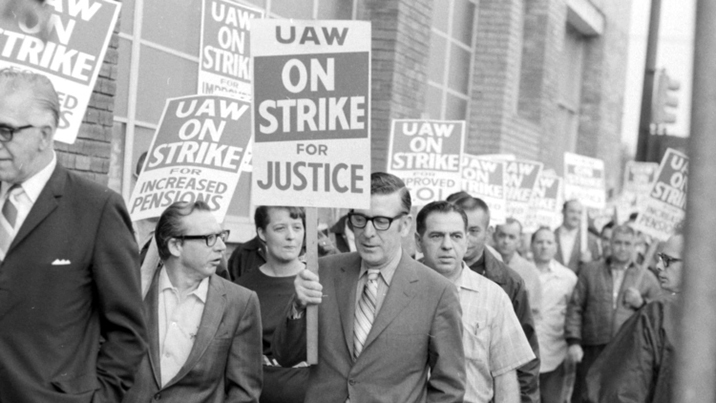This interview was originally published on October 8, 2013. In this episode of Reality Asserts Itself, Frank Hammer discusses the pressures on Detroit auto workers’ wages that came from the American and global south.
PAUL JAY, SENIOR EDITOR, TRNN: Welcome back to The Real News Network. I’m Paul Jay in Baltimore. And welcome back to Reality Asserts Itself.
Our guest this episode is Frank Hammer. This is part three of our series of interviews with Frank. And we’re just going to pick up where we left off. And you really should watch the first two parts, ’cause this part will make more sense to you that way.
Thanks for joining us again, Frank.
FRANK HAMMER, COFOUNDER, AUTOWORKER CARAVAN: Thank you again.
JAY: So just to remind everybody, Frank is a retired General Motors employee. He worked there for 32 years. He was the president and for a time chairman of the United Auto Workers Local 909, which was the GM Transmission Plant.
So, Frank, we’ve been talking about various things leading up to you getting to become an autoworker and then the sort of struggle that takes place, much of which was with the leadership of the UAW. But you said that the leadership of the UAW, why they didn’t fight, it was also a very objective global situation of, you know, all these new workers coming on board, and especially with new digitization and raising the level of the productivity of workers outside North America and Europe, but especially in China. Workers started to produce cars that were good cars. And, you know, just as Japan, you know, early on, made in Japan was supposed to be a negative, and then it became a positive, well, the products produced in China became pretty good. And it became a tremendous competitive pressure.
And so, to some extent did the leadership of the union think they were going to be immune to these forces in the autoworkers? ‘Cause they could see it happening perhaps in other sectors a little earlier, but they didn’t seem in any way to develop a level of militancy amongst the workers to contend with this, that, as you say, they kind of gave in to concessions rather soon.
HAMMER: Yeah. I think that there–I think they saw the reality, and I think they also somewhat arrogantly thought that they had the answer, and that, their answer, was the mantra that we hear today: we have to be more competitive, we have to be more competitive. I mean, that’s all you hear.
JAY: And what’s wrong with that? Is that true? Is there some truth in it?
HAMMER: Well, the notion–yeah, of course there’s some truth to it. We have to produce. And I think U.S. vehicles are in fact great quality, are produced very efficiently.
But the problem is that while we’re becoming more competitive, our union ranks have declined by a million. So it’s answered some questions, but it’s left some other questions wide open as to what are we going to do with this crisis, that the system is generating a whole surplus of workers not only in the United States, but in other parts of the world, so that we have a worldwide sort of glut of workers under global capitalism. And it really is sort of the question now is having a glut of workers, there’s something wrong with capitalism, because capitalism is not employing.
JAY: I mean, it’s not like there isn’t as much wealth being created.
HAMMER: Correct.
JAY: In fact, there’s probably more wealth being created. It’s just going into fewer and fewer hands and people can’t buy stuff.
HAMMER: In the time period that I’ve been an autoworker, the disparity of wealth between the capitalist class in the United States and the workers has increased, has grown. And it didn’t matter what political power party was in power. There’s a trajectory that shows that wealth has been much more concentrated, certainly since the most recent financial crisis. And so we’re not answering some very basic questions with the strategies that we have in place, which is to be more competitive.
JAY: Well, the real crash that happens in ’07, ’08, which is a financial crisis leads to a profound crisis throughout the whole economy, it triggers a crisis in the auto industry. They essentially go bankrupt, two of the three, Chrysler and GM, but more for underlying reasons, no, than just what was happening in ’07-’08. In other words, not just the financial crisis leads to this collapse.
So if it’s about these global competitive pressures and–then I guess two questions. First of all, I’ve heard it said that labor as the cost of a car actually wasn’t that significant when you’re talking about competitive pressures. But it seemed that everybody bought that idea, including most of the autoworkers seemed to have bought that idea.
HAMMER: The estimate for labor costs is, like, about 8 percent of the price of a vehicle was labor cost. Okay? So the idea that somehow the crisis for auto was due to overpaid autoworkers was really a very convenient argument to make us the scapegoats. And if we see any kind of crisis, we always see that they managed to make a scapegoat to blame for in fact what is a crisis of the system. But we want to blame it on workers. And I think that–.
JAY: So when President Obama comes in with a bailout, you know, one of the biggest pieces of the bailout was essentially lowering starting workers’ wages. I think it went, what, from around $24 to $26 to start down to $14, something in that area.
HAMMER: We were already on that track before the crisis. In fact, this is the effort on the part of UAW, to make the companies more competitive by already introducing two-tier. And two-tier was introduced prior to the bankruptcy. So even the two-tier strategy was not able to stave off this bankruptcy crisis.
And I want to say that I look at it just the other way around. They have over the years agreed to the contracts that we have in place, and they’re looking for a way out of them. And how do we get out of them? Well, there’s a very convenient financial crisis that’s going on.
And, by the way, GM and Ford and Chrysler were all financial players in Wall Street. They weren’t just auto producers. They all had companies that loan, that had created mortgages of the subprime type, just like the other financial houses. So they were all players in that as well.
So here’s a crisis convenient for basically gutting the contracts that existed between the companies and the workers. So now we have, as you mentioned, workers who came in at $14 an hour–and less, by the way. There are workers in auto companies that were making $11 an hour, which is barely minimum wage.
JAY: So I’ve interviewed you before, as any people watching Real News know, and we’ve dug into this Obama bailout in some detail. So we don’t need to go over that again. And we’ll link this story to those stories. It’ll be easier to find.
I’m kind of interested. Where are autoworkers at now? Do they see this Obama public bailout as a great thing, that the alternative would have been the collapse of the industry? Or do they see themselves as having been manipulated and all this into lower wages and such? Is there a rising level of militancy amongst them? I mean, a lot of these autoworkers probably are also people that lost their houses. I mean, Detroit’s just–you know, the housing market, and so many people lost their houses across the country, but Detroit was particularly hit. I mean, what’s the mood?
HAMMER: Being a retiree and networking in one of the plants, it’s–I’m a little bit more distant from the situation, but the way I read it is that there’s a lot of frustration. The workers that were grandfathered with the higher wages, their wages have been frozen now for maybe six, eight years. And there’s an element of frustration there. There’s an element of frustration among the second-tier workers because they understand that they’ve gotten the short end of the stick. And, unfortunately, that separation between the two tiers is being used against each other by creating these divisions, so that you’ll have a parent working on one side of the line and the son or daughter working on the other end of the line, and there’s tension and there’s animosity. So you both have signs–.
JAY: Well, over what? I mean, how does it come up? I mean, concretely, what choice does anyone have? They’re kind of–.
HAMMER: They’re stuck. And a typical refrain is that, oh, stop complaining; you should be happy to have a job.
JAY: The older ones say to the younger ones.
HAMMER: Yeah.
JAY: And the younger ones say what to the older ones?
HAMMER: How did you–were you looking out for us?
JAY: Or why’d you agree to this deal?
HAMMER: Why’d you agree to this?
But the underlying element, which is what we were talking about before, is that people understand that this is still better than not having a job at all. And it goes back to this whole question of surplus labor. And that has to be addressed. The organizing that we–we’ve had other conversations about organizing among the unemployed.
JAY: Yeah, ’cause it’s not just about, you know, global workers coming, you know, entering the workforce. There’s so much of the American workforce is unorganized and, you know, out of need will work for far less money. Yet even still you don’t see the unions–you know, here and there you see some organizing efforts, but not a massive organizing effort. And you–I mean, I always thought–I never understood how the UAW just wouldn’t have organized every coffee shop in Michigan, I mean, never mind, you know, other parts of the industrial sector, and just have this massive union state. Now you have a situation where, you know, Michigan politics is actually run by the right, and they’re using that as a base to even further attack the unions.
HAMMER: Right. Yeah. I think you’ve touched on something that is very critical, and that is that all the way through the ’80s and ’90s and into the this century, we were unable to organize the South, the big plants, the big transplants. So you had Volkswagen, you had Toyota, you had Nissan, you had Mercedes.
JAY: Yeah, you didn’t need China. You just had the southern United States playing the same role.
HAMMER: Absolutely. And our inability to figure out how those workers would be brought into the union, well, what happened in the bankruptcy is one of the edicts of the bankruptcy bailout was workers in the North now had to match the conditions of workers in the nonunion South. So whereas we were always talking about bringing up the level of the southern workers to the standards of the North, it’s actually flipped on itself. And to guarantee that that happened, they also put a no-strike pledge into the agreement for the bailout until 2015. So you’re right. We’re stuck. And we had to match now nonunion conditions.
So how do we now organize? How do we make these organizing effort, for example, that’s going on in Nissan in Mississippi when the northern plants had to match the southern conditions? It makes it much more difficult.
JAY: So is there now a focus on organizing the South? I mean, it seems that’s kind of the obvious logical next step. You’re not going to be able right now to help do very much to organize autoworkers in China, but it could be a massive effort to organize workers in the South.
HAMMER: Obviously, the UAW’s making some efforts in that direction, and there is a very big organizing drive that’s currently going on in Nissan. And I think they’re also working on trying to organize Volkswagen.
Unfortunately, the model remains the same. We’re going to be good partners to the company. And that might work, and it might bring in–company might, you know, relent on, oh, we oppose the union. But they’re going to do it on the company’s terms that they’ll be a joint partner.
JAY: And what’s hanging the southern workers up? I mean, why wouldn’t they join in mass?
HAMMER: Well, I think that there’s been a very careful screening process going on in the southern plants, where workers have to go through a bank of tests and union proclivities and so on. And you have to compare where are those workers coming from. They’re coming either from low-wage areas in the South, and the auto job looks like a pretty good job.
JAY: I mean, relatively speaking, it is.
HAMMER: Relatively speaking.
JAY: It is.
HAMMER: If anybody’s suggesting that we have an easy task ahead of us, we don’t. It’s a difficult task. But it has to be approached with a different framework. And I think the framework of we’re good partners to the companies is ultimately not going to work.
JAY: Now, go back to part of an earlier conversation we had. Most of the left, at least the left that’s kind of audible, which means on the internet, doesn’t pay a lot of attention to these kinds of things. You know, Walmart organizing gets some attention, not certainly is much as it deserves, but actually–and McDonald’s and fast food gets some attention, again, not as much as it deserves, but some. But the struggle in the South–I know the nurses have made a big drive to organize nurses in the South, and actually, they say, with quite a bit of success recently. They have apparently organized several thousands nurses in the last six, eight months. But it’s a great battle that’s taking place to stop this trend that the North should become the South and flip it the other way. But most of the left seems detached from this. And go back to the very beginning of our conversation, how in your day, you know, the left saw connecting with working-class struggles as the way to fight on these fronts of, like, Vietnam and other issues. Still very much of a disconnect now, it seems to me.
HAMMER: I’m familiar with a labor conference of progressives that took place not too long ago. I think it was in Rutgers at New Jersey. And one of the themes of that conference was in fact we have to re-examine the whole question of organizing the South and strategies used for that purpose. So I think there are some progressives that are understanding the absolute necessity of doing that, and I think that’s a hopeful sign. And I think some of the unions–I’m less familiar with the non-auto sector, but I think that they’re sort of waking up to this question [incompr.] ultimate necessity to do that.
JAY: Now, you were involved in something called the Autoworker Caravan. What was that about? And is that–what are you guys doing now?
HAMMER: Well, I think that it’s very important. We actually–the bailout issue is what gave birth to us when they were talking about letting the plants go out of business. And I think one of the strongest assets that we’ve come out of that situation with is an understanding about the need to convert the closed plants. One of the things that we went to Washington with is–when we were the Autoworker Caravan was to talk about what are we going to do with all the plants that were shuttered. And we put it–.
JAY: So you’re talking buildings that have been–locks put on the doors, sitting empty.
HAMMER: Sitting empty.
JAY: I mean, there was–I mean, President Obama, you know, sort of said–I was going to say suggested, but I think he was quite overt–when he was running in ’08, he talked about linking this issue of a green economy to solving the problem of the recession. And by investing in the, you know, green infrastructure, you would also create thousands and thousands of jobs. And then it wasn’t too long after he got elected we didn’t hear too much more about that.
HAMMER: Right. And I think that–I’m very proud of the fact that autoworkers are seeing the connection between re-creating more employment and the catastrophe that’s sort of waiting in the wings around global warming. And I think the more that autoworkers understand that connection and say, we ought to be advocates for converting these plants and to be able to produce solar energy, to be able to produce wind energy, would be both helping the Earth and helping humanity and all the living creatures, and at the same time generating a new kind of manufacturing economy, especially in Detroit, which some people have been prepared to sort of write off. And I think there’s autoworkers that are not prepared to do that and that want to fight.
JAY: And it’s not just about the buildings. I mean, it’s actually more about the talent, the skill set, you know, the skilled tradesmen that exist in Detroit. It must be one of the highest concentration of skilled tradesmen on the planet, many of whom are sitting at home.
HAMMER: Unfortunately, the defense industry recognizes that really well, so they’re coming into the Detroit metropolitan area, especially in Macomb County, and they’re generating employment that is related to a defense economy, to a militarized economy, which is a no-win situation for us, because that means that we should be always in perpetual war to continue to create our jobs.
The alternative model should be a green model to really address the real crisis that we should be dealing with, and that’s getting away from fossil fuels, getting away from cars that run on fossil fuels, and advocating more for rapid transit.
JAY: Okay. Well, in the next segment of interview, we’ll talk about you and your passion about climate change and environmental issues, ’cause it seems to me you’re as passionate about that as you were about the Vietnam War.
So please join us for the next segment of our interview with Frank Hammer on Reality Asserts Itself on The Real News Network.
Never miss another story
Subscribe to theAnalysis.news – Newsletter
“Frank Hammer is a retired General Motors employee. He worked there for 32 years. He is the former president of United Auto Workers Local 909 and also worked at the GM department of the United Auto Workers. He’s an adjunct faculty member at Wayne State University, and he’s a passionate defender of his adopted city, Detroit.”









